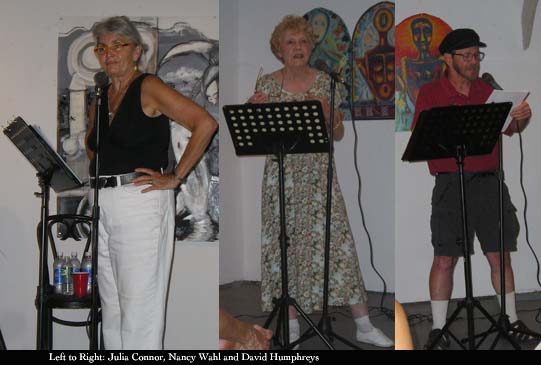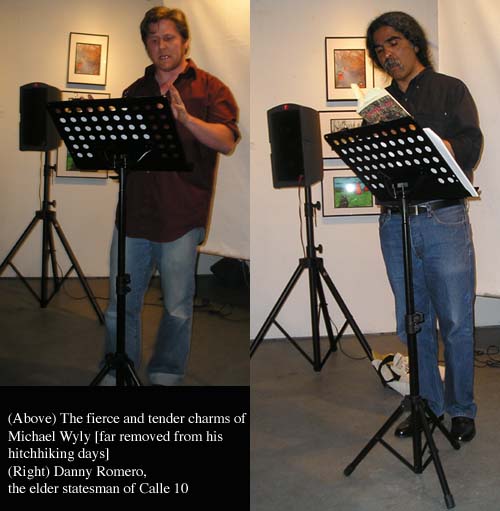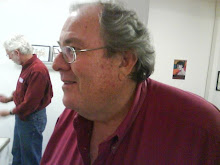
Indigo Moor was host to three area poets on June 19, one of them Sacramento’s Poet Laureate, Julia Connor, whose grit and effervescence as usual was captivating. Before the three featured readers began, Matthew Fox provided a solo guitar piece on a nylon string guitar. The piece started with some purposely dissonant chords and then employed a sort of bossa nova like rhythm. It was kind of like listening to Egberto Gismonti play “The Love Theme from Shrek,” an enticing concoction.
Then with Matthew’s guitar as accompaniment, Indigo read a short piece about desire, how the need was so deep. The rhythm was the driving force throughout the piece and indeed near the end Indigo informed everyone in the audience that “rhythm is pre-memory.”
Julia Connor, though billed as reading from Chrysanthemum a book about the loss of a stepson, Connor read a generous sampling of unpublished poems. Connor explained that the title of the book (Chrysanthemums) was used because the Chinese flower of mourning. However, she said that she wasn’t going to read those poems because of their somber tone. Then, suddenly the microphone drooped on the stand. Connor said, I’ve known men like you.” then she proceeded to launch into the evening while apologizing that many of the pieces had been tried out on a Nevada City audience a few days earlier.
In “The Apricot” Connor illustrates one of the reasons that her work has been so well-received over the years. It has many elements of surprise. The poem is a love poem addressed to another—“We thought we were unfortunates together . . . we gave each other slack . . . mutually appearing like a door that swung open.” The speaker then wonders what it would have been like if the other had been a pine. “Things might have been different. The speaker then “hides in narrative” and questions the lack they shared, that whatever they lacked it was not tenacity. The speaker then contemplates what the two had accomplished together, concluding “this much was accomplished . . . a haven for sparrows.”
In “Bamboo,” again inspired by a domestic setting, the speaker contemplates a bamboo grove at the edge of the property line. It serves as font of mystery and domesticity where “a man’s shirts and jeans hang . . . his shoes await him.” The speaker notes for the reader to “look past absence,” to the “fullness of the bamboo.” The speaker questions the coming into existence of a thing that was previously absent. The speaker is singing a song of awareness, of consciousness-raised, how we see a thing and then name it.
“Julia Morgan, Architect” was inspired by play that recently ran at California Stage starring one of Sacramento’s brightest lights, Janis Stevens. The play was a play about Julia Morgan, the architect responsible for the design of Hearst Castle among other things. The poem spoke to the concerns of the architect in its language—“Oh clock, oh chimney, oh cornice.”
“Lead” was a complicated piece that spoke of solace after accusations had been made concerning an act of physical violence.
In contrast to “Lead” was a very simple piece with a kind of dreamy imagery. The speaker dreams of a field unchanged, blue flowers everywhere. In that field it is the speaker’s last day to be alive. A reassuring voice tells the speaker that he/she has done enough, that he/she can pick as many as are wanted.
“Joe’s Poem” continues to morph over time. The poem originally read at the American River College reading [March 13, 2006] employed multiple scenarios that featured Connor’s father. The recent incarnation of “Joe’s Poem” focused on a father-daughter fishing excursion where dear old dad teaches his daughter about toughness, about how to “tie one’s own laces in the world.”
“Cremare” from the Latin “to burn” was a poem with a speaker asking for help, but the vastness of the world intercedes with all its urgency and unfamiliar danger.
In “Word” a surrealist parable unfolds that primarily celebrates the ability of the word to create other worlds. The poem starts out with the image of the sun washing “clapboard yellow of old ivory.” Other surprising images ensue and a “knowing that comes through the ear.” A helicopter dries its wings at eye level and flies off into other parables, “flashing chartreuse.” The flashing color of the “dragonfly” reminds the reader of all those hidden worlds made accessible through language.
“The Flowers War” was a long, complicated piece that took root mainly as a poem of protest against the war. The “growth economy blind to death” is indicted and compared to the pre-Renaissance church selling redemption.
Nancy Wahl read from her Poets Corner Press chapbook prize-winning contest.volume entitled “Proof of Life,” but before she did that, she recited William Carlos Williams’s “Red Wheelbarrow” (replacing “glazed with rain water” with “filled with rain water”). From this poem by Williams she derived her theme for the evening, that it takes all the parts working together to make a whole. Wahl spoke of how she had been under a lot of stress recently due to her impending move to Carmichael. This event took its toll as she seemed to be distracted and somewhat too apologetic during her reading.
She started the reading with “Blueberries on Mars” which was inspired by the report that the Mars rover had found little concretions on the surface of the planet which were called blueberries.The poem started on the American River Bike Trail and ends on Mars. In this way Wahl pointed to the connectedness of all things large and small.
“Pakistani Woman” grew out Wahl’s Bible study group where the study of Rahab, a prostitute from Canaan who saved the spies sent by Joshua to Jericho and who was later incorporated into the Israeli population. Rahab was compared to Pakistani woma who was gang-raped because she did not adhere to strict Islamic law.
“The Last Refuge of the Bengal Tiger” was inspired by the sad story of woman who had an abusive husband and who turned her and her daughter’s life around by going to law school and getting a law degree. The poem begins in the gynecologist’s office with the giggles of a young girl. The scene then is transferred to a discussion of the day-to-day life of the Bengal tiger. The Mahabharata is invoked and in one of its stories, the tiger wanders but is poached. The giggling girl in the gynecologist’s office wanders but cannot find her father. The speaker then offers that if they lay los, like the tiger, they will survive.
“Daughter” was inspired by the same family as “Bengal Tiger.” In this poem the mother has taken up “exotic dancing.” She is dancing in stiletto heels. The audience sees her as a woman in her sexual prowess. She attracts the attentions of an older lecherous man (the speaker comments that he is like her husband). then she comes home and lavishes affection on her daughter with “the moon like hyssop on the wall.”
“The Given” also is derived from another mother-daughter relationship. the mother is fretting over her missing daughter. She is searching for clues about her disappearance in the daughter’s room. the mother clutches the daughter’s stuffed rabbit out of desperation, hungry to commiserate with her daughter. She does this because it is given that she’s a mother.
“The Memory of Water” was prefaced by Wahl as being a “true” poem. It started by stating that the “fragrance of lilac has a lot to do with water.” Mary Cassatt’s lilacs are invoked. At the end of the poem Wahl confessed that the poem was “not true” after all, which made many in the audience scratch their heads and chuckle.
David Humphreys took the stage, paying tribute to Connor and Wahl who came before him, by suggesting he might not be up to the task of following such fine and refined poets.
Humphreys’s pieces ranged from extended haiku, longer poems that were comprised of short fragments of observed visual detail and longer meditations, that used less laconic language, which focused on technical subjects.
“Magpie” was of the extended haiku sort. It praised the scavenger bird for being as handsome as his bird-of-prey counterparts.
“Tilt-up” was an homage to the construction practice of pouring concrete walls on the ground and hoisting them up into place. The speaker was submerged in a tank, “looking for a place that turned back on itself.”
New Back Fence chronicles the trials and tribulations of putting up a new back yard fence that borders on the property line of a cheapskate neighbor. Hmmmmm, two poems about property lines in one night. Interesting.
“Shiloh” was about an old dog Humphreys had. He had written a poem about the dog and mistakenly deleted it. now here it is again in a little different form, hopefully with most of the details still intact.
“Old Volvo” reminisced about an old car as the speaker imagined the first owners of the vehicle before the speaker became the owner.
“Whiskey, Yankee, Tango, Bravo” was dedicated to the spirit of soldiers who died in Vietnam, in a jungle so far away.
"Dark Energy, Dark Matter" is the kind of poem mentioned above that uses scientific/technical terms to approach its subject. In it, the speaker holds forth on the universe’s confounding secrets and disparate charms.






















